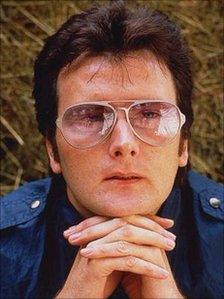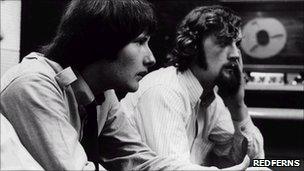Obituary: Gerry Rafferty
- Published

Rafferty had played in two successful bands before Baker Street
Gerry Rafferty's Baker Street provided a welcome relief from the wall-to-wall disco that dominated the UK charts in the late 1970s.
A masterpiece of record production and dominated by a haunting saxophone, it told the story of everyone who feels stuck in a rut with no prospect of improvement.
"He's got this dream of buying some land, He's gonna give up the booze and the one night stands." The words reflected Rafferty's own musical career and the temptation of the demon drink to which he succumbed.
Gerald Rafferty was born in Paisley on 16 April 1947, the son of a Scottish mother and an Irish father, who taught his young son to holler out Irish rebel songs.
He began his musical career as a busker, playing to the passers-by on London Underground, where the inspiration for his most famous hit was born.
Stealers Wheel
Back home in Scotland the comedian Billy Connolly had formed a duo called The Humblebums, which played in pubs and clubs around Glasgow.
Rafferty was reputed to have earned £80,000 a year from the royalties on Baker Street. Clip courtesy United Artists/EMI
Rafferty had begun writing his own songs and asked Connolly if The Humblebums would be interested in playing them at their gigs. Instead, he was asked to join the band.
The Humblebums enjoyed some success with Rafferty on board, touring the UK and releasing two albums.
However, Rafferty fell out with Connolly when the latter's jokes and stories began to take up more and more time at the band's concerts, and he quit in 1970.
Two years later, he recorded his first solo album, the well received but under-performing Can I Have My Money Back, before getting together with an old school friend, Joe Egan, to form the band Stealers Wheel.
Their eponymous debut album was well received by critics and the record buying public, and generated the hit single Stuck in the Middle with You.
The song reappeared for a new generation in 1992 when director Quentin Tarantino included it on the soundtrack of his film Reservoir Dogs.
City to City
Constant personnel changes and what seemed to be a never ending series of legal wranglings stifled any more success for Stealers Wheel, and Rafferty and Egan ended their partnership in 1975.
It was 1978 before he was in a position to record a second solo album but he did it with style. City to City became a huge hit while the single Baker Street entered at No 3 in the UK Top Ten.

With Billy Connolly in 1967
Coming as it did at the height of disco fever, it became a staple of every music radio station and is still widely played, 30 years after its release.
Rafferty was reputed to have earned £80,000 per annum from the royalties on Baker Street alone but money was never a motivation for him.
He turned down requests to travel to the US and promote the album and his reluctance to make live appearances dampened record sales.
His follow up album, Night Owl, with contributions from Richard Thompson, was again well received but failed to emulate the success of City to City.
It was to be the high point of Rafferty's career. His next two albums, Snakes and Ladders and Sleepwalking failed to make any impact.
Recluse
His career was not helped by the decision of United Artists to sell their recording division to EMI. Rafferty's inability to reproduce the success of Baker Street meant he failed to make an impact on his new label.
Rafferty all but disappeared by the mid 1980s, although he did surface to co-produce the Proclaimers hit, Letter From America.
By now the only stories appearing about him in the press reflected his continuing battle against the bottle.
Newspaper reports said he had trashed a London hotel while on a drinking binge and had subsequently checked into hospital with liver problems.
In 2009 he released Life Goes On, a collection of songs that had previously been available as downloads on his website.